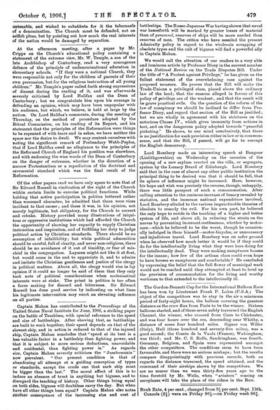Of the other papers read we have only apace to
note that of Sir Edward Russell in vindication of the right of the Church within certain limits to exercise political functions. While holding that active participation in politics bettered rather than worsened character, be admitted that there were vices incident to that career ; and these it was, in his opinion, not merely legitimate, but obligatory, for the Church to correct and rebuke. History provided many illustrations of iniqui- tons or oppressive institutions which had afforded the Church the opportunity of showing her capacity to supply Christian instruction and inspiration, and of fulfilling her duty to judge political action by Christian standards. There should be no assumption of infallibility ; but while political admonition should be careful, full of charity, and never non-religious, there should be no avoidance of it out of timidity, or fear of mis- chief in the congregation. Laymen might not like it at first, but would come in the end to appreciate it, and to admire and imitate the Christian gentleness and justice of the clergy in political matters. Above all, the clergy would rise in lay opinion if it could no longer be said of them that they only took note of political considerations when ecclesiastical interests were at stake. The priest in politics is too often a force making for discord and bitterness. Sir Edward Russell has done good service by indicating on what lines his legitimate intervention may exert an elevating influence on all parties.






























































 Previous page
Previous page